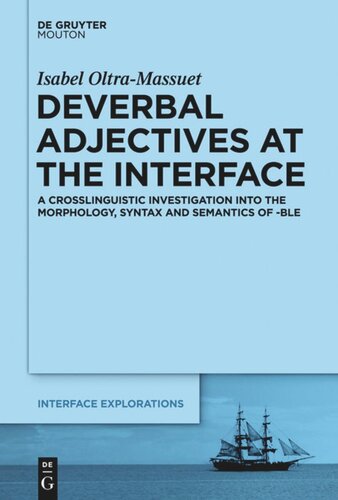

Most ebook files are in PDF format, so you can easily read them using various software such as Foxit Reader or directly on the Google Chrome browser.
Some ebook files are released by publishers in other formats such as .awz, .mobi, .epub, .fb2, etc. You may need to install specific software to read these formats on mobile/PC, such as Calibre.
Please read the tutorial at this link: https://ebookbell.com/faq
We offer FREE conversion to the popular formats you request; however, this may take some time. Therefore, right after payment, please email us, and we will try to provide the service as quickly as possible.
For some exceptional file formats or broken links (if any), please refrain from opening any disputes. Instead, email us first, and we will try to assist within a maximum of 6 hours.
EbookBell Team

4.4
92 reviewsThis volume explores the syntax, semantics, and morphology of -ble adjectives within Distributed Morphology. It presents a decompositional analysis of -ble that captures intralinguistic variation and accounts for morphologically more complex languages. It contributes novel empirical data. First, the grammaticality of -ble formations derived from unergatives and unaccusatives in Spanish is argued to be a function of their exoskeletal properties in interaction with language-specific facts and features of the grammar of cognation, degrees, quantification and Aktionsart. A previously unnoticed correlation between the Spanish data and a cognate configuration with unaccusatives in English reinforces the proposal. Second, the grammaticality of denominal -ble adjectives in Romance and their absence in English relates aspects of the internal structure of -ble to issues pertaining to the eventive properties and syntactico-semantic status of the base nouns. This crosslinguistic proposal implicates central issues in the syntax-semantics-morphology interface, e.g. cross category derivations, locus of variation, or status of impossible words.